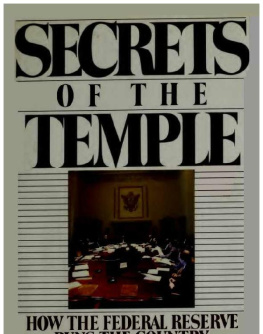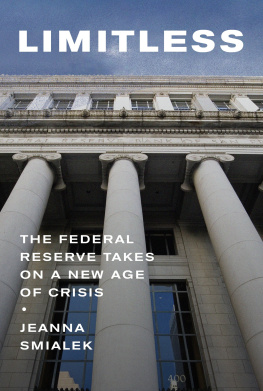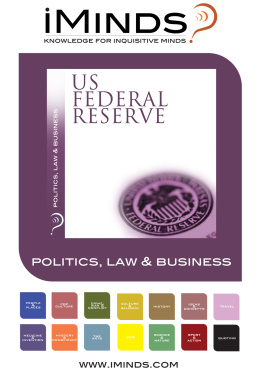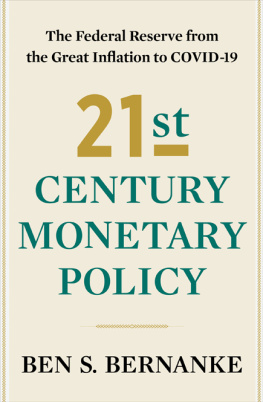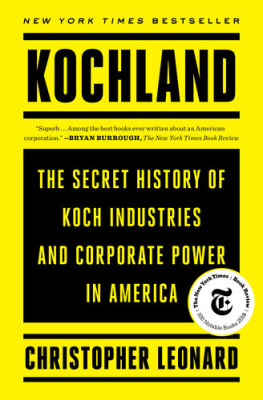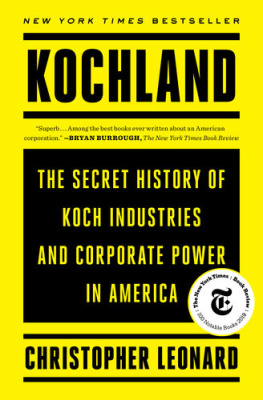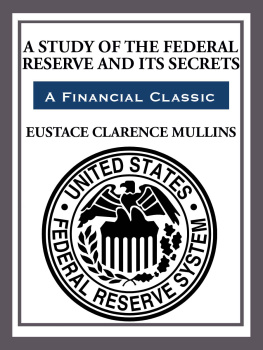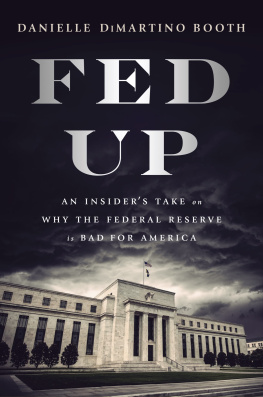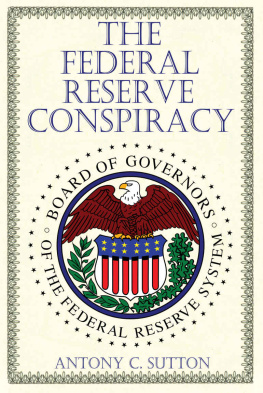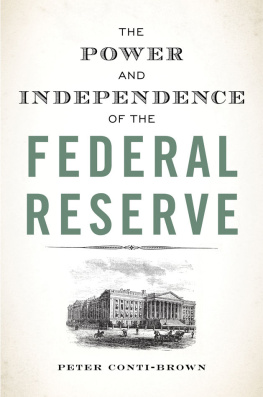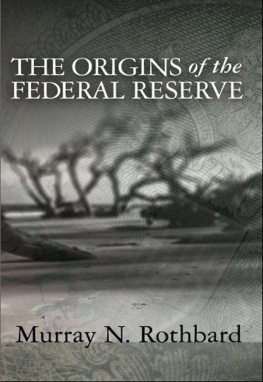Copyright 1987 by William Greider All rights reserved including the right of reproduction in whole or in part in any form.
Published by Simon and Schuster A Division of Simon & Schuster, Inc.
Simon & Schuster Building Rockefeller Center 1230 Avenue of the Americas New York, NY 10020
SIMON AND SCHUSTER and colophon are registered trademarks of Simon & Schuster, Inc.
Designed by Helen L. Granger/Levavi & Levavi Manufactured in the United States of America
7 9 10 8 6
Library of Congress Cataloging in Publication Data
Greider, William.
Secrets of the temple.
Bibliography: p.
Includes index.
1. Board of Governors of the Federal Reserve System (U. S. ) 2. Federal Reserve banks.
3. Monetary policyUnited StatesHistory20th century. 4. Banks and bankingUnited States
History20th century. 5. FinanceUnited States History20th century. I. Title.
HG2563:G72 1987 332. 1'1'0973 87-16712
ISBN 0-671-47989-X
Portions of this book appeared originally in The New Yorker
CONTENTS
1 THE CHOICE OF WALL STREET
In the American system, citizens were taught that the transfer of political power accompanied elections, formal events when citizens made orderly choices about who shall govern. Very few Americans, therefore, understood that the transfer of power might also occur, more subtly, without elections. Even the President did not seem to grasp this possibility, until too late. He would remain in office, surrounded still by the aura of presidential authority, but he was no longer fully in control of his government.
The American system depended upon deeper transactions than elections. It provided another mechanism of government, beyond the reach of the popular vote, one that managed the continuing conflicts of democratic capitalism, the natural tension between those two words, democracy and capitalism. It was part of the national government, yet deliberately set outside the electoral process, insulated from the control of mere politicians. Indeed, it had the power to resist the random passions of popular will and even to discipline the society at large. This other structure of American governance coexisted with the elected one, shared power with Congress and the President, and collaborated with them. In some circumstances, it opposed them and thwarted them.
Citizens were taught that its activities were mechanical and nonpolitical, unaffected by the self-interested pressures of competing economic groups, and its pervasive influence over American life was largely ignored by the continuing political debate. Its decisions and internal disputes and the large consequences that flowed from them remained remote and indistinct, submerged beneath the visible politics of the nation. The details of its actions were presumed to be too esoteric for ordinary citizens to understand.
The Federal Reserve System was the crucial anomaly at the very core of representative democracy, an uncomfortable contradiction with the civic mythology of self-government. Yet the American system accepted the inconsistency. The community of elected politicians acquiesced to its power. The private economy responded to its direction. Private capital depended on it for protection. The governors of the Federal Reserve decided the largest questions of the political economy, including who shall prosper and who shall fail, yet their role remained opaque and mysterious. The Federal Reserve was shielded from scrutiny partly by its own official secrecy, but also by the curious ignorance of the American public.
It was in midsummer of 1979 when this competing reality of the American system confronted the President of the United States and discreetly compelled him to yield. Jimmy Carter, in the third year of his Presidency, was engulfed by popular discontent and declining authority. The public that first embraced the simple virtues Carter expressed in his gentle Georgia accentearnest striving and honest, open governmentwas by then overwhelmingly disenchanted with his management. Despite its accomplishments, the Carter Presidency had come to stand for confusion and inconsistency. His stature was diminished by a series of ill events, from failed legislation to revolution in Iran. A Gallup poll asked Democrats whom they would prefer as their partys nominee in 1980 and they chose Senator Edward M. Kennedy of Massachusetts over the incumbent President, 66 to 30 percent.
In early July, Jimmy Carter set out to restore his popular support. The political crisis had been developing for many months but was now dramatized by the Presidents own behavior. He scheduled an address to the nation on energy problems, then abruptly canceled it and, somewhat mysteriously, withdrew from the daily business of the White House. He and his closest advisers gathered in private at Camp David, the presidential retreat in the Maryland mountains. For ten days, the President remained there in isolation, conducting earnest seminars on what had gone wrong with the Carter Presidency and, indeed, what had gone wrong with America itself.
A stream of influential visitors was summoned to the Presidents lodge to offer advice. They were diverse opinion leaders from politics, education, religion and other realms, and their talk skipped across the landscape of American life. In his methodical manner, Carter filled a notebook with their comments. Each day, the press speculated extravagantly on what the President intended to do.
On Saturday, July 14, the isolation ended and Jimmy Carter returned to the White House. The next evening, more than two-thirds of the national audience gathered before their television sets to hear his report. After two and a half years, Carters unusual mannerisms were familiar to the public, the rising and falling cadences that sounded like a Protestant preacher, the cheerful smile that sometimes oddly punctuated stern passages. This speech was different, more somber in tone, more desperate in content.
The President began with a startling ritual of confessionrevealing excerpts of the private criticism he had collected at the Camp David meetings. Mr. President, a southern governor had told him, you are not leading this nationyou are just managing the government. Others comments were equally critical. You dont see the people enough anymore. Dont talk to us about politics or the mechanics of government, but about an understanding of our common good. Some of your Cabinet members dont seem loyal. There is not enough discipline among your disciples. Mr. President, we are in trouble. Talk to us about blood and sweat and tears.
A religious leader had told him: No material shortage can touch the important things like Gods love for us or our love for one another. Carter said he especially liked the comment from a black woman who was mayor of a small town in Mississippi: The big shots are not the only ones who are important. Remember, you cant sell anything on Wall Street unless someone digs it up somewhere else first. The President was candid about his own shortcomings as a political leader: I have worked hard to put my campaign promises into lawand I have to admit, with just mixed success.
The present crisis, however, was not really a matter of legislation, Carter declared. America faced a crisis of the soul, a testing of its moral and spiritual values. The threat is nearly invisible in ordinary ways, the President warned. It is a crisis of confidence. It is a crisis that strikes at the very heart and soul and spirit of our national will. We can see this crisis in the growing doubt about the meaning of our own lives and in the loss of a unity of purpose for our Nation.

